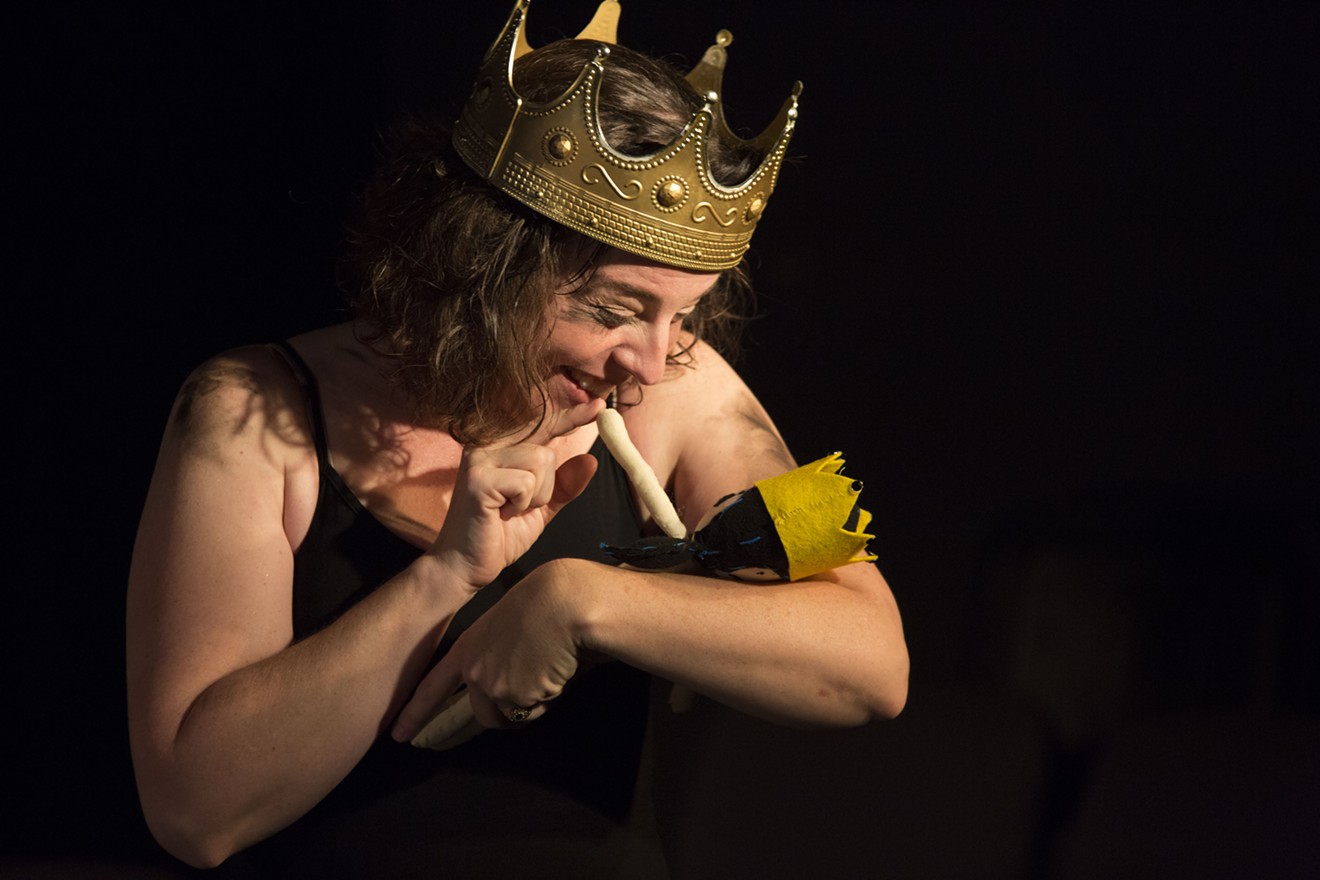Prism’s iteration is simply called Lear. Audiences might wonder how theater so rooted in language could be done wordlessly, but for Prism, it’s just business as usual. Prism co-artistic director Katy Tye adapted the play, and co-artistic director Jeffrey Colangelo directs. Colangelo says watching Tye’s adaptation process was fascinating.
“It’s like watching someone translate from English to another language," he says. "One of the things I know inspired Katy to start writing this adaptation was the first scene of the play, where Lear's daughters profess their love for their father. Immediately, she realized how easily she could translate each of the daughter's speeches into dances.”
Tye looked closely at those speeches. Regan and Goneril, the daughters who betray their father, had “empty, flowery” speeches, which translated into elaborate dance sequences. Cordelia’s simple, earnest profession of love lent itself to “honest, pedestrian movements,” she says. Styles range from African dance to Pina Bausch, ballet and modern dance.
From there, Tye combed through the play, finding the movement equivalents for major plot developments.
“Shakespeare is language based, but it is also very physical," she says. "The idea, as it always does, started small with just the idea of the daughters dancing to show their love for Lear.”
Another change the audience will notice is the decision to cast a woman, Marianne Galloway, as Lear.
“It wasn't a conscious decision to make Lear a woman,” Tye says. “We auditioned men and women, and we liked what Marianne brought to the character. It reads different to some, but in my mind, a mother works just as well as a father in this family drama.”"The absence of words gives us the freedom to cast however we want and push for more diverse and interesting casting.” – Jeffrey Colangelo, Prism Movement Theater
tweet this
Colangelo adds that Prism does not adhere to gender-specific casting.
“Honestly, we made Lear a woman because Marianne Galloway was the best actress in the room," he says. "For a while now, Prism Movement Theater has been making a conscious effort to look at our casting decisions and ask ourselves, 'Do they have to be a certain sex? Do they have to be a certain race?' For our wordless movement theater, the answer to those questions is almost always a solid no. The absence of words gives us the freedom to cast however we want and push for more diverse and interesting casting.”
Tye agrees that the key emotions and attributes of Lear are not inherently gendered.
“We all are capable of feeling stubbornness, rage, jealousy, goofiness, joy, madness and deep, deep loss, and Marianne Galloway is able to express these thoughts and feelings in a way that is truly masterful," she says.
Galloway is deaf and is used to interpreting facial expressions and body movements.
“It was a rare gift to have spoken language removed from the equation and express myself through sound and movement, as well as receive my scene partners’ communications in the same form," she says. "Spoken language sounds like the adults in a Peanuts cartoon to me.”
The main challenge for Galloway was understanding Lear and developing empathy for the character. Galloway says as a woman, she always related closely to Lear’s daughters.
“You have to understand why and how they make the choices they make, and so I viewed the character of Lear purely through the eyes of the daughters until I was cast in the Prism production," she says.
Now that she’s played Lear as a queen and mother, she thinks exploring the text in that context would be fascinating.
“I have a feeling it wouldn’t be quite as freeing and fulfilling an experience as it has been to explore without the text," she says.
For audiences unfamiliar with the original play, Colangelo says not to worry.
“I feel like we don't give our audiences enough credit as far as what they can or can't understand. People are incredibly good at reading body language and picking up on gestural cues," he says. "In fact, they're so good at it that we've made an entire theater company around crafting narratives with just those reliable tools.”
And for seasoned Shakespeare fans, Galloway thinks Tye and Colangelo's wordless adaptation will provide new things to think about.
“The creative team — Jeff, Katy, Beth Lipton and Mitchell Stephens — have done a remarkable job of laying out the foundation of the characters and their relationships to each other," she says. "From that foundation, they carefully built in specific conceits that serve as major plot points. One great joy has been having close friends attend who know nothing of Lear besides the name and discovering how clearly and easily they followed the story.”
Lear, through Sunday, Nov. 19, Theatre Three, 2800 Routh St., $40, theatre3dallas.com.












